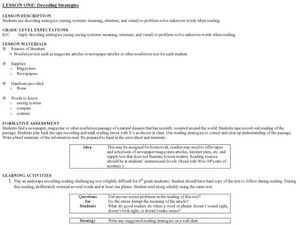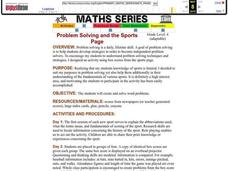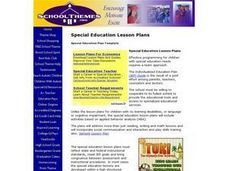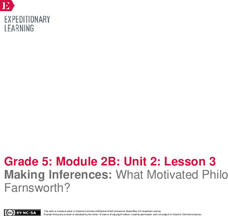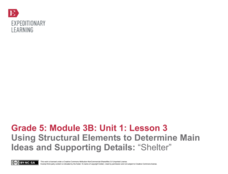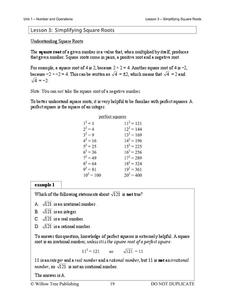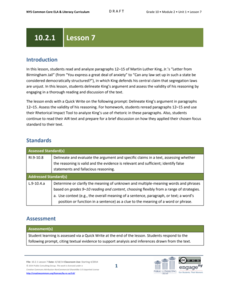Curated OER
Classroom demographics
Students use strategies to read and comprehend words and material. The use of technology is the backbone of this lesson and is essential for implementation.
Curated OER
Word Worms: Spelling Or Vocab Game
Students engage in a lesson that is concerned with the meaning of different types of vocabulary words. They sort words into different groups and play a game while creating graphic organizers of plants with roots and worms. Students work...
Curated OER
Lesson One: Decoding Strategies
Review decoding strategies to read a chosen text. Readers tape themselves reading out loud, listen to the recording, and mark where they have misread words or phrases. They then discuss which words were misread and review how to correct...
Curated OER
Foods
Students identify what types of items are grown on a farm. They discuss how those items are processed and turned into food they everyday. They are to write a paragraph using transition words.
Curated OER
The Sounds of Daydream
Based on the poem "The Lake Isle of Innisfree" by Irish poet William Butler Yeats, this resource is well constructed and guides learners through examining the Yeats poem (rhyme, meter, content) to composing a poem of their own about a...
Curated OER
Problem Solving and the Sports Page
The use of box scores from baseball games is the foundation of this math lesson. Organize your class into groups of four, and give identical box scores from a baseball game that was just played. Have them create word problems from the...
Curated OER
Special Education Plan
Special needs students practice completing everyday tasks such as organizing a day plan, reading a clock and completing simple math problems. They define the proper learning techniques for their disorder and utilize props in learning...
Curated OER
Family Life
What is family? Challenge your scholars to write an encompassing definition of what this word means to them. After reading "It May Be a Family Matter, But Just Try to Define Family," class members discuss the emotional issues surrounding...
ReadWriteThink
Literature Circles: Getting Started
Make reading more enjoyable and interactive with literature circles! Here you'll find detailed lessons to begin the literature circle process. Ten lessons introduce each role learners take on. Literature circle roles include...
EngageNY
Mid-Unit 1 Assessment: Human Rights Vocabulary and Common Prefixes
Here is a mid-unit assessment for a group of lessons studying the Universal Declaration of Human Rights (UDHR). The first half of this instructional activity calls for several forms of review. Your class will review the content of the...
EngageNY
Summarizing Complex Ideas: Comparing the Original UDHR and the "Plain Language" Version
The eighth lesson plan in this series continues the focus on vocabulary and increasing young readers' awareness of academic language. Pairs of learners participate in a short vocabulary review activity called Interactive Words in which...
Prestwick House
Vocabulary in Context: Wilderness Survival
Do you have what it takes to survive in the wilderness? A high-interest reading passage offers practical advice while incorporating vocabulary practice. Follow-up worksheets focus on skills such as defining words, making inferences, and...
Curated OER
Phineas Gage: Notecard Vocabulary Strategy
Understanding the vocabulary in a text, especially a text like Phineas Gage: A Gruesome but True Story About Brain Science that includes quite a few technical terms, can be the key to understanding the text as a whole. Learners focus on...
Curated OER
Connotation and Denotation: How Word Choice Affects a Paragraph
Review the terms denotation, connotation, diction, and mood in paragraph writing. After defining the terms, middle schoolers practice writing examples of both connotation and denotation. They complete a connotation and denotation graphic...
EngageNY
Making Inferences: What Motivated Philo Farnsworth?
Turn on the tube. Learners take a look at pages 10-13 of The Boy Who Invented TV. They work in groups and complete a first read to determine the gist of the section. They then reread the pages to make and revise previous inferences and...
EngageNY
Close Reading: “Dog Sleds” and “Kayak”
Visualize it! Scholars read pages 12–15 of The Inuit Thought of It and create a visual gist of the text. They then do a close read of the text and create a natural environment anchor chart before answering text-dependent questions.
EngageNY
Using Structural Elements to Determine Main Ideas and Supporting Details: “Shelter”
Does the picture tell the story? Learners continue their work in The Inuit Thought of It by creating a visual gist of pages 16 and 17. They then complete a main idea graphic organizer and discuss key supporting details.
Math Worksheets Land
Multistep Ratio and Percent Word Problems - Step-by-Step Lesson
What happens when you have a recipe and need to up the measurements? Here is a lesson that explains how to use ratios to convert measurements and percents with worked out problems. Also provided are additional resources and practice...
Willow Tree
Simplifying Square Roots
The square root of five and five do not have the same value! How many times have you addressed this with math classes? A instructional activity gives an explanation of a square root and gives examples for simplifying square root...
EngageNY
Introducing the Struggle for Survival in the Introduction of World without Fish
No fish? Catch a word. Scholars read World without Fish and record unfamiliar vocabulary in their word catchers. They discuss word meanings as well as root words. They answer text-dependent questions before discussing the importance of...
EngageNY
Grade 11 ELA Module 2: Unit 1, Lesson 2
Scholars read paragraphs one and two of the chapter "Of Our Spiritual Strivings" and search for ideas. Readers analyze how Du Bois introduces and develops an idea throughout the text. They complete the Idea Tracking Tool and discuss two...
EngageNY
Events and Venn Diagrams
Time for statistics and learning to overlap! Learners examine Venn Diagrams as a means to organize data. They then use the diagrams to calculate simple and compound probabilities.
EngageNY
Grade 10 ELA Module 2: Unit 1, Lesson 7
Scholars read King's "Letter from Birmingham Jail" paragraphs to identify his arguments and reasoning. They discuss their ideas in pairs and small groups, complete a Model Argument Delineation Tool, and respond to a quick writing prompt.
EngageNY
Grade 11 ELA Module 2: Unit 1, Lesson 20
Scholars analyze the fifth paragraph of Booker T. Washington's "Atlanta Compromise" speech. They learn more about his point of view toward color as he addresses the "white race." Pupils review their Idea Tracking Tools in pairs, answer...
Other popular searches
- Multiple Word Meanings
- Word Meanings in Context
- Foreign Word Meanings
- Word Meanings From Context
- Similar Word Meanings
- Clarify Word Meanings
- Vocabulary. Word Meanings
- Word Meanings Lesson Plans
- Glossary Word Meanings
- Meanings of Word Parts
- Word Meanings/definitions
- Multiple Word Meanings 4th




